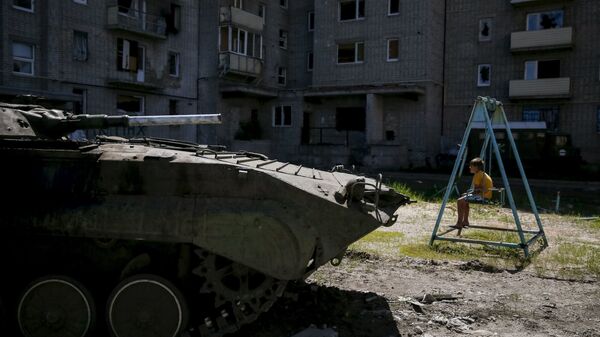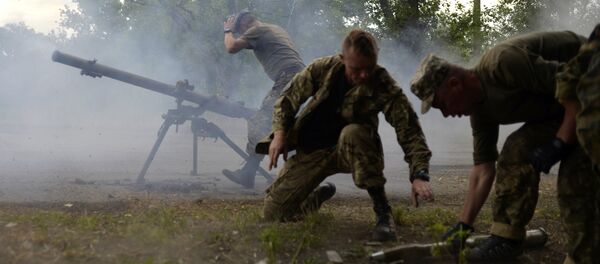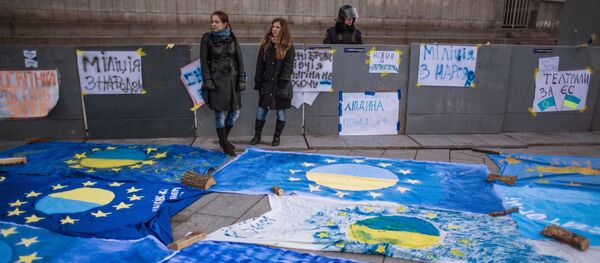(By Daniele Pozzati) — This is not your average western media coverage of the war in Donbass. Gone is the familiar narrative of "Russian aggression," and there are no unfounded allegations of Moscow's meddling. Donbass militia leaders and Ukrainians politicians are also absent.
The plight of Donbass is instead seen through its inhabitants' eyes: the reportage mentions those who left, but focuses on those who have stayed, especially on those who are fighting — for survival, but also literally, in the local militias.
"We defend our children, our elderly, our homes," says a young female soldier of the Novorossiya Armed Forces. "This is what patriotism means."
Here, where people tried to follow in Crimea's footsteps, the former host city of the UEFA Euro 2012 championship is no longer. Kiev is not talked about with hate or resentment, but as the capital of a foreign country that insists on reclaiming newly-independent territories.
"Threatened by Kiev's new pro-Western coup government, the largely Russian population of Donetsk and Lugansk held a referendum to secede from Ukraine," recalls the narrating voice. "The resulting autonomous republics were backed by Russia, but opposed by the EU and the US."
"The EU and the US mobilized in favor of Kiev to reconquer the two rebel territories: it has been war, violent and cruelty, since May 2014," continues the narrating voice as the cameraman zooms on the ruins of Donetsk airport, "whose destruction isolates the two republics from the rest of the world."
Ukraine's Anti-Terrorist-Operation is exposed, before millions of Italian viewers, for what alternative media have long showed it to be: a massacre of ordinary people. Their representatives had never committed terrorist acts, but simply demanded that the UN-sanctioned right of self-determination be applied to their communities.
The documentary proceeds to address another much-ignored aspect of this war: the many children among the casualties. We see a ceremony where friends, relatives and other attendees release 101 white balloons into the air, in memory of each child who "died under Ukrainian fire."
Aerial views of the countryside show Nikishino, a utterly devastated village. "There are many villages like this between Donetsk and Lugansk," explains the reporter, "completely eviscerated by Ukrainian bombs."
Kiev has indeed long resumed shelling these areas. Its daily violations of the Minsk II agreements, as documented by OCSE, have reached alarming levels. In the report we also learn that only last week, a Ukrainian Battalion had moved in near the airport, in an attempt to reconquer the long fought-over area.
Maurizio Blondet, a senior Italian journalist for L’ Avvenire, a major Catholic daily, is puzzled by the documentary: "One swallow does not make a summer," he says, "I do not think that RAI has changed its editorial line regarding the Ukraine crisis."
Coverage of the Ukraine crisis by the Italian mainstream media has indeed been in line with other Western countries, i.e. pro-Kiev, if somewhat less belligerent in tone.
"This is a rare example of a documentary which was produced in the territory of the rebel provinces," confirms Fulvio Scaglione, another experience journalist, author and former editor of Famiglia Cristiana, Italy's Catholic weekly: "Such reports are usually produced in Ukraine. The resulting angle, always Ukrainian."
Scaglione, who has written extensively about the Ukrainian and Middle Eastern crises, notices within the population at large a growing skepticism towards the mainstream account of major international crises: "It is too homogeneous and repetitive to be convincing, and the Ukraine crisis, just like Syria and, before it, Iraq, is no exception."
"Everybody has understood that, within such crises, the rights and wrongs are never fully with either side. But this is exactly how the mainstream media keep portraying them."



